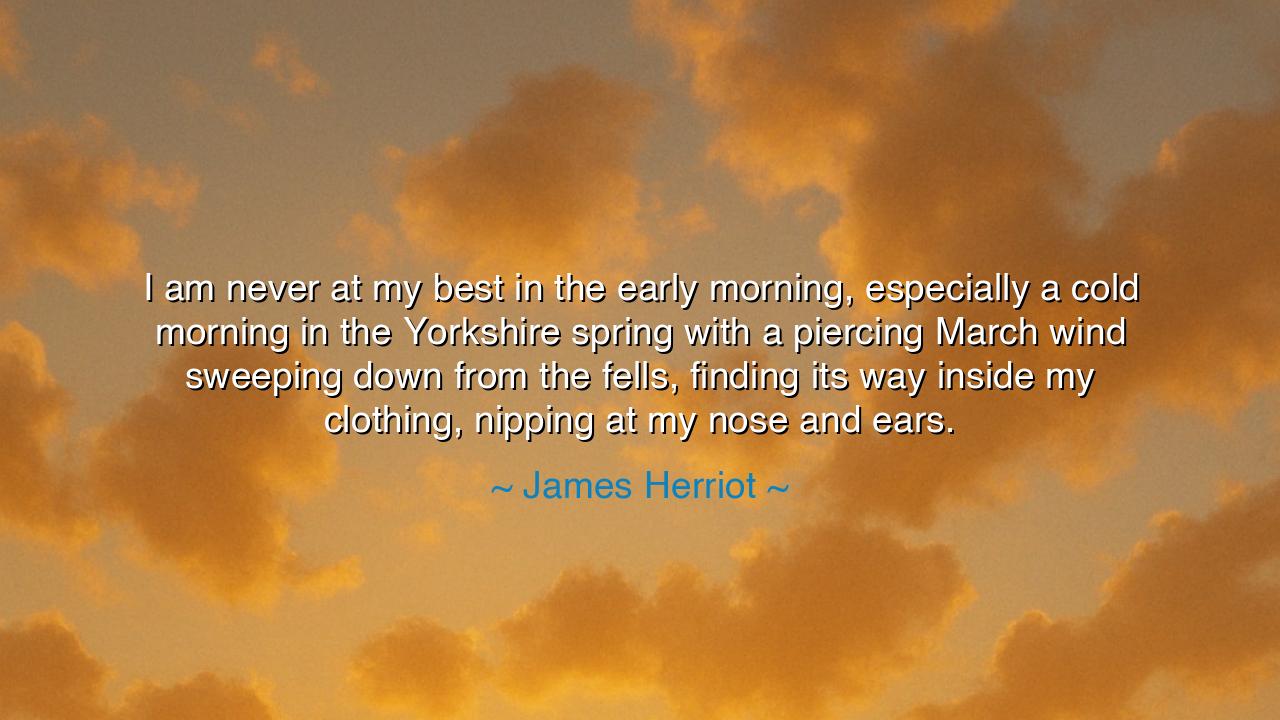
I am never at my best in the early morning, especially a cold
I am never at my best in the early morning, especially a cold morning in the Yorkshire spring with a piercing March wind sweeping down from the fells, finding its way inside my clothing, nipping at my nose and ears.






The words of James Herriot, “I am never at my best in the early morning, especially a cold morning in the Yorkshire spring with a piercing March wind sweeping down from the fells, finding its way inside my clothing, nipping at my nose and ears,” speak not only of the body’s discomfort, but of the eternal struggle between man and the sternness of nature. In these few lines lies the voice of one who has labored in the fields of duty, rising at dawn when all instincts would bid him remain in the warmth of rest. It is a confession of weakness, yet also an acknowledgment of resilience, for the man who names his burden has already shown the courage to endure it.
The early morning has long symbolized beginnings—new labors, new trials, new burdens. Yet Herriot reminds us that beginnings are seldom easy, especially when they are wrapped in the chill of adversity. The cold morning becomes not just a condition of weather, but a metaphor for those hours in life when duty summons us before our spirit is ready, when we must act though comfort is absent. The wind from the fells, biting at the nose and ears, is the whisper of nature herself, reminding mankind that he is small, and that every step of his work must be earned.
In ancient times, even the greatest men knew this trial. Consider the story of Hannibal of Carthage, who led his army across the snowbound Alps. His soldiers, weary and frozen, cursed the cold that bit through their armor and the snow that swallowed their steps. Yet though Hannibal surely was not at his best in those frozen dawns, he pressed forward, for the purpose that burned in his heart was greater than the comfort he lacked. Herriot’s complaint, tender and human, mirrors this truth: that the world does not wait for us to be at our best. The summons of life arrives when it will, often upon the wings of hardship.
The Yorkshire spring, with its piercing March wind, is thus no mere setting, but a stage upon which the drama of perseverance is played. Nature tests the healer before he tends the sick, tests the shepherd before he tends his flock. For Herriot, a veterinary surgeon, those mornings were preludes to long days of service to both beast and man. His honesty in admitting his frailty gives voice to a universal truth: greatness is not the absence of weakness, but the willingness to rise in spite of it.
The lesson for us is plain. We, too, face mornings—some literal, some symbolic—when our hearts are heavy, our spirits reluctant, and the winds of circumstance cut through us like knives. It is easy to say, “I am not at my best,” and turn aside. But the path of wisdom teaches us to acknowledge the hardship, yet step forward regardless. Comfort is fleeting; duty endures. Strength is not found in waiting for better weather, but in braving the storm with steadfastness.
Therefore, let each man and woman prepare themselves for their own Yorkshire mornings. When the chill of challenge strikes, clothe yourself not only with garments, but with resolve. Protect your spirit as well as your body, and remind yourself that the biting wind cannot enter the soul unless you permit it. Rise, even if not at your best, for often it is in rising while weary, enduring while frail, that the soul forges its mightiest strength.
Practically, this teaching bids us to set small rituals of discipline: to wake when the alarm tolls, to face tasks without delay, to welcome struggle as the tempering fire of character. Just as the farmer knows that crops are not grown in ease but in toil under sun and frost, so must we accept that our growth demands labor in hours we least desire. And when we falter, let us remember Herriot’s words, spoken not in despair but in quiet perseverance, a testimony that even those who heal and serve confess their humanity.
So, beloved listener, take this wisdom: the cold morning is but a trial of the flesh. The spirit, if resolved, can walk through it unbroken. When next you feel the wind of life piercing your comfort, recall these words, and let them be not an excuse to retreat, but a call to endure. For though we are not always at our best, we are always capable of rising—and in rising, we prove ourselves worthy of the day.






AAdministratorAdministrator
Welcome, honored guests. Please leave a comment, we will respond soon